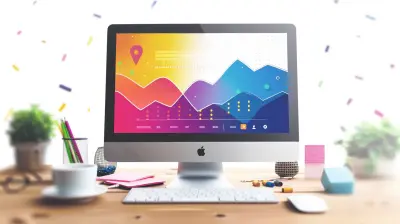Why Taking Breaks is Essential for Long-Term Success
19 May 2025
We live in a world where hustle culture rules. Everyone’s grinding, working late nights, skipping lunch, and wearing exhaustion like it’s a badge of honor. But let’s pause for a second (no pun intended) and ask ourselves: Is this sustainable? The truth is, burning the candle at both ends might make you feel productive in the short term, but it’s not a recipe for long-term success.
In fact, taking breaks is one of the most underrated tools to achieve your goals. It sounds counterintuitive, right? How can stopping what you’re doing actually help you get ahead? But hear me out—short pauses, whether it’s stepping away from your desk for five minutes or taking a weekend off, recharge your mental and physical batteries, boost your creativity, and improve your productivity. Let’s break it down together, step by step.
The Myth of Constant Hustle
Somewhere along the line, we’ve been fed this idea that non-stop work equals success. You’ll hear things like, “Stay on the grind!” or “Sleep is for the weak.” And those quotes look great on Instagram paired with a sleek image of a luxury car or someone climbing a mountain. But let’s be real—no one talks about the burnout that comes with it.Fact check: Your brain isn’t designed to focus on one task for hours on end. When you push through without giving yourself a breather, your performance starts to dip. Ever feel like you’re staring at your screen, reading the same sentence over and over, making zero progress? That’s not laziness—it’s your brain waving a white flag, begging for a time-out.
Why Breaks Matter More Than You Think
Here’s the thing: Taking a break isn’t “wasting time”; it’s investing in your future self. Think of it like charging your phone. If you keep running at 1% battery, eventually, you’ll shut down. Giving yourself small moments to pause can bring major benefits. Let’s unpack why breaks are a game-changer.1. Breaks Boost Your Productivity
Ironically, working non-stop makes you less productive. Studies have shown that taking short, regular breaks improves focus and efficiency. It’s no coincidence that successful companies like Google encourage employees to take naps and use relaxation pods. When you give your brain a chance to reset, you come back sharper, quicker, and ready to tackle challenges head-on.2. They Spark Creativity
Ever notice how your best ideas don’t come when you’re grinding? Instead, they pop up when you’re in the shower, on a walk, or about to fall asleep. That’s the magic of stepping away. Breaks allow your brain to switch gears, which can unlock the creative part of your mind. If you’ve been stuck on a problem, taking a break might just be the secret to your next “aha” moment.3. Breaks Reduce Stress
Let’s not sugarcoat it—work can be stressful. Deadlines, meetings, emails piling up—it all adds up. Taking breaks reduces stress by helping your body shift from a “fight-or-flight” response to a more relaxed state. Think of it as hitting the reset button on your cortisol levels. A walk around the block or even a quick stretch can calm your nerves and make the day feel less overwhelming.4. They Improve Your Health
Your body wasn’t built to sit at a desk for eight hours straight. Staring at screens, bad posture, and lack of movement can take a toll on your health. Small breaks to stretch, hydrate, or move around keep your blood flowing, prevent aches and pains, and even reduce the risk of long-term health issues like heart disease or diabetes. Let’s face it: If you don’t have your health, success doesn’t mean much.
How to Take Breaks Without Feeling Guilty
If you’re like most people, the idea of taking a break might come with a side of guilt. You might worry that stepping away will make you look lazy or fall behind. But trust me, breaks are not the enemy—they’re your secret weapon. Here’s how to integrate breaks into your day without feeling bad about it:1. Schedule Your Breaks
Treat breaks like meetings—they’re non-negotiable. Use techniques like the Pomodoro Technique, which involves working for 25 minutes and taking a 5-minute break. Or block out larger chunks of time—like an hour in the afternoon—to step away. Following a schedule reminds you that breaks are just as important as work.2. Set Boundaries
It’s easy to tell yourself, “I’ll stop when I finish this one last thing.” But let’s be honest, there’s always one more thing. Set clear boundaries. If you’ve decided to take a break at 3 PM, stick to it. During your break, resist the urge to check emails or scroll your work chat. Use the time to truly disconnect.3. Find Your Break Style
Not all breaks are created equal because, let’s face it, not all of us recharge the same way. Some people might feel refreshed after a quick walk outside, while others find comfort in sipping coffee and people-watching. Experiment with different activities—reading, meditating, stretching—to find what works for you.4. Disconnect Completely
When it’s time for a break, make it a real break. Step away from screens, mute notifications, and give your brain a chance to focus on something unrelated to work. Scrolling through social media might feel like a break, but it actually keeps your brain in “work mode.” Instead, try something offline—like doodling, journaling, or just sitting quietly.
Long Breaks: The Ultimate Recharge
While small breaks throughout the day are essential, don’t overlook the importance of bigger breaks. Vacations, weekends off, or even a mental health day can provide deeper rejuvenation that short breaks simply can’t. Think of it like rebooting your computer—a full system refresh works wonders.When you allow yourself to disconnect for an extended period, you gain perspective. You remember why you started working toward your goals in the first place. You find renewed motivation. And you come back with a clearer vision of what’s next.
The Ripple Effect of Rest
Taking breaks doesn’t just benefit you—it creates a ripple effect. When you show up rested and focused, your work quality improves. Your family and friends get the best version of you, not the cranky, overworked version. You’re more patient, more creative, and ultimately, more successful.Think of rest as sharpening the axe before chopping down a tree. If you keep hacking away without sharpening, the job gets harder and harder. But when you stop to sharpen? You’re unstoppable.
Final Thoughts: Success Is a Marathon, Not a Sprint
At the end of the day, success isn’t about how hard or how long you work—it’s about working smart. Taking breaks doesn’t mean you’re slacking off; it means you’re prioritizing your long-term goals over short-term busyness. It’s about understanding that rest isn’t the opposite of productivity—it’s a part of it.So, the next time you feel guilty about stepping away, remind yourself: You’re not pausing your progress. You’re fueling it. Long-term success requires endurance, and endurance requires rest.
Don’t wait for burnout to teach you the importance of breaks. Build them into your life now, and watch how your energy, creativity, and results soar. After all, even the most successful people know the value of downtime. Now, it’s your turn.
all images in this post were generated using AI tools
Category:
ProductivityAuthor:

Caden Robinson
Discussion
rate this article
2 comments
Noelle McMillan
Embracing breaks isn’t just self-care; it’s a smart strategy for sustained success. Recharge, refocus, and return with renewed energy. Your best ideas often emerge after stepping away. Take that break!
May 22, 2025 at 11:30 AM

Caden Robinson
Absolutely! Taking breaks is crucial for creativity and productivity. Stepping away helps us recharge and can lead to our best ideas. Thanks for emphasizing this important strategy!
Kenzie Lynch
“Taking breaks is like hitting the refresh button on your brain! It’s the secret sauce that transforms ‘meh’ into marvelous. Remember, even your computer needs a breather—so why not your brilliant, busy mind?” 🌟🧠✨
May 22, 2025 at 4:48 AM

Caden Robinson
Absolutely! Breaks are vital for recharging our minds and boosting creativity. Even a short pause can lead to incredible improvements in focus and productivity! 🌟


